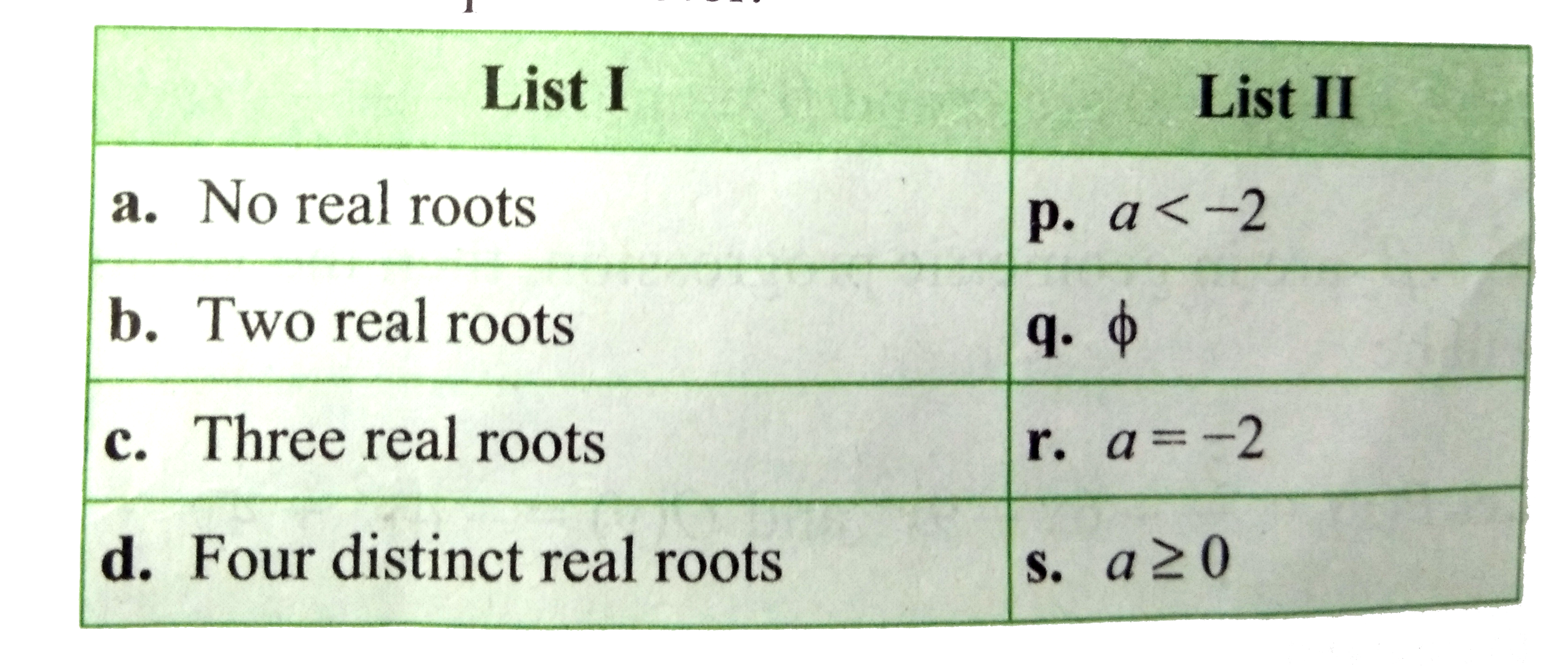Given that α,γ are roots of the equation Ax2−4x+1=0,andβ,δ the roots of the equation of Bx2−6x+1=0, such that α,β,γ,andδ are in H.P., then a.A=3 b. A=4 B=2 d. B=8Solution in Bengali
A = 3
A = 4
B = 2
B = 8
The correct Answer is:1,4
Since α,β,γ,δ are in H.P. , 1/α,1/β,1/γ,1/δ are in A.P. and
the may be taken as a−3d,a−d,a+d,a+3d . Replacing x
by 1/x, we get the equation whose roots are 1/α,1//beta, 1//gamma, /σ .
Therefore , equation x2−6x+B=0 has roots a - d , a + 3d Sum of
the roots is
2(a−d)=4,2(a+b)=6
∴a=5/22,d=1/2
Product of the roots is
(a−3d)(a+d)=A=3
(a−d)(a+3d)=B=8 .
Topper's Solved these Questions
- THEORY OF EQUATIONSBOOK - CENGAGE PUBLICATIONCHAPTER - THEORY OF EQUATIONSEXERCISE - Linked Comprechension Type
37 Videos
- THEORY OF EQUATIONSBOOK - CENGAGE PUBLICATIONCHAPTER - THEORY OF EQUATIONSEXERCISE - MATRIX MATCH TYPE
6 Videos
- THEORY OF EQUATIONSBOOK - CENGAGE PUBLICATIONCHAPTER - THEORY OF EQUATIONSEXERCISE - Single Correct Answer Type : Exercise
89 Videos
- STRAIGHT LINESBOOK - CENGAGE PUBLICATIONCHAPTER - STRAIGHT LINESEXERCISE - ARCHIVES (NUMERICAL VALUE TYPE)
1 Videos
- THREE DIMENSIONAL GEOMETRYBOOK - CENGAGE PUBLICATIONCHAPTER - THREE DIMENSIONAL GEOMETRYEXERCISE - All Questions
291 Videos
Similar Questions
Consider an unknow polynomial which divided by (x−3) and (x−4) leaves remainder 2 and 1, respectively. Let R(x) be the remainder when this polynomial is divided by (x−3)(x−4).
If equations R(x)=x2+ax+1 has two distint real roots, then exhaustive values of a are.
View SolutionMatch the following for the equation x2+a|x|+1=0 where, a is a parameter.

View SolutionThe value of expression x4−8x3+18x2−8x+2 when x=2+√3
View SolutionFor a point P in the plane, let d1(P)andd2(P) be the distances of the point P from the lines x−y=0andx+y=0 respectively. The area of the region R consisting of all points P lying in the first quadrant of the plane and satisfying 2≤d1(P)+d2(P)≤4, is
View SolutionFind the angle between the line whose direction cosines are given by l+m+n=0andl2+m2−n2=0.
View SolutionIf alpha,beta are the roots of the equation x^(2)+px+1=0 gamma,delta the roots of the equation x^(2)+qx+1=0 then (alpha-gamma)(alpha+delta)(beta-gamma)(beta+delta)=
View SolutionIf α,β,γ,δ are the roots of the equation x4+Ax3+Bx2+Cx+D=0 such that alpha beta=gamma delta=k and A,B,C,D are the roots of x4−2x2+4x2+6x−21=0 such that A+B=0 then the value of CA, is
View SolutionGiven that α, γ are roots of the equation Ax2−4x+1=0 and β, δ are roots of the equation Bx2−6x+1=0. If α, β,γ and δ are in H.P., then
View SolutionIf α,β,γ and δ are the equation x4−1=0, then the value of aα+bβ+cγ+dδaγ+bδ+cα+dβ+aγ+bδ+cα+dβaα+bβ+cγ+dδ, is
View Solutionα and β are the roots of the equation x2−3x+a=0 and γ and δ are the roots of the equation x2−12x+b=0.If α,β,γ, and δ form an increasing GP., then (a,b)-
View SolutionGiven that α, γ are roots of the equation Ax2−4x+1=0 and β, δ are roots of the equation Bx2−6x+1=0. If α, β,γ and δ are in H.P., then
View SolutionIf alpha, beta, gamma, delta are the roots of the equation x^(4)+4x^(3)-6x^(2)+7x-9=0 ,then the value of (1+alpha^(2))(1+beta^(2))(1+gamma^(2))(1+delta^(2)) is
View SolutionGiven that α,γ are roots of the equation Ax2−4x+1=0 , and
β,δ1 the equation of Bx2−6x+1=0, such that
α,β,γandδ are in H.P., then
View SolutionGiven that α, γ are roots of the equation Ax2−4x+1=0 and β, δ are roots of the equation Bx2−6x+1=0. If α, β,γ and δ are in H.P., then
View SolutionGiven that α,γ are roots of the equation Ax2−4x+1=0,andβ,δ the roots of the equation of Bx2−6x+1=0, such that α,β,γ,andδ are in H.P., then a.A=3 b. A=4 B=2 d. B=8
View SolutionGiven that α, γ are roots of the equation Ax2−4x+1=0 and β, δ are roots of the equation Bx2−6x+1=0. If α, β,γ and δ are in H.P., then
View Solution
